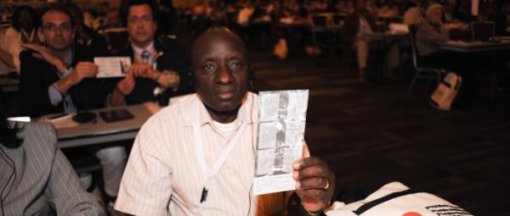Paddy Crumlin, MUA national secretary 25 Jun 2010 MUA national secretary addresses the International Trade Union Confederation World Congress in Vancouver, Canada today. The ITUC represents 176 million workers in 156 countries and territories and has 312 national affiliates, with Sharan Burrow, former ACTU President now elected ITUC General Secretary.

Paddy Crumlin, Mich-Elle Myers and Dean Summers, MUA with Sharan Burrow ITUC general secretary and outgoing general secretary Guy Ryder
Sisters and Brothers, Greetings and solidarity from the Australian Council of Trade Unions
My comments on Part 2 to those aspects directed at concretely building our organizational capacity.
Specifically my comments are directed at the identification of the strengths and weaknesses of the council of global unions formed with the express focus of strengthening our structural partnership.
The report can be broadly described as good news and bad news.
The good news is that it has structure and funding – so it will be durable.
The bad news is – it hasn’t done much illustrated by the wonderful euphemism in the report “Much more progress remains to be made”.
So if we are honest this new structural partnership under current commitments won’t do much, but it won’t do much for a very long time.
Brothers and Sisters the Washington conference on organising recognition and union rights developed a two pronged strategy.
1. Promote organising methodology and understanding
2. Assist in translating that understanding and skill to concrete and specific outcomes
This in essence reduces our conversation over the last 3 days on dealing with the challenges Guy and Sharan so articulately posed.
Can we successfully prosecute campaigns in real and practical terms for a new form of globalisation, NOW – THE PEOPLE.
A globalisation of inclusion not exclusion. A globalisation that is not ageist, sexist, racist. The divisions imposed on us by the elitist and exclusive globalisation that dominates our contemporary lives.
Their globalization brought us to the brink of collapse and will keep us peering into that abyss of economic financial and material crisis until effectively dealt with.
We have been driven to this precipice by elitism and self interest at best and greed and criminal negligence at worst. These are the characteristics of the new world order, order unencumbered by any real empathy for the suffering and dislocation and poverty that are the waster products of it’s machinations.
Our globalisation is concretely anchored in organising strategy reinforced by the partnership between the sectoral industrial responsibility of the GUF’s and the strategic responsibilities of the ITUC. Both operate regionally, sub regionally and nationally. The points of intersection are many and varied, that is why we need structure.
For analytical reasons
To minimize duplication
To enhance resource utilization
To communicate more effectively
And to act together more coherently.
The global council of trade unions is not a place in Brussels; it is a conversation in every region in every country. It is both top down and bottom up.
It is not a hall of towering rhetoric but a process nurturing new trade union structures and attitudes fuelled by objective review of outcomes and actions promoting our work plans, the work plans of this new growth model.
It is only a new growth model if it sees capital differently including not only its regulation but its opportunities through workers capital and other mechanisms.
It is only a new growth model if trade union density goes up instead of down.
It is only a new growth model if doing a little for a long time is not acceptable. There is only the proposition of doing lots by many today and every day.
That unambiguous commitment to our new trade union globalization brings us back in 4 years measuring how far we have come and not despairing on how far we have to go.
Now on this day La Fete Nationale De Quebec a traditional day of renewal let us make this declaration.
Now
We – The People.
It is our day. Let us seize it
Go to the ITUC WEBSITE for more Congress reports







